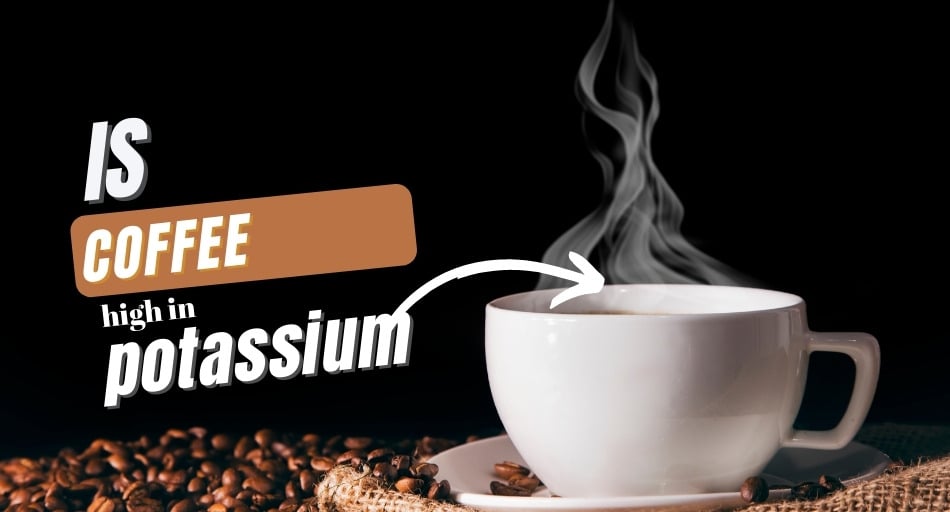Coffee is a rich source of antioxidants and has many health benefits. It's also addictive because of its caffeine content.

Still, a lot of people who drink coffee always complain when they run out of it. Coffee has some surprising health benefits. It helps to improve mood, cognitive function, and athletic performance while also reducing the risk of dementia or Alzheimer's disease.
However, is coffee high in potassium?
Table of Contents
Is Coffee High in Potassium?
Coffee contains a somewhat considerable amount of potassium. Compared to other beverages, coffee has a high potassium concentration. Potassium is an important mineral that helps regulate fluid balance and blood pressure in the body. It also plays a role in nerve function and muscle contraction.
Can You Check Your Potassium Level at Home?
How Much Potassium is in Coffee
1 cup of coffee has around 116mg of potassium. This is less than 5% of the daily recommended intake for adults. The daily recommended intake for potassium is 4,700mg. Taking too much coffee in one sitting may raise your potassium levels because of the high potassium content in coffee.
Health Benefits of Coffee
Coffee is rich in antioxidants and has many health benefits. Here are some of the health benefits of coffee.
Coffee helps to keep our bodies active
The caffeine in coffee helps to increase alertness and improve cognitive function. Caffeine also helps to increase metabolism and promote weight loss.
If a person drinks coffee and was feeling cold, the caffeine in coffee can help to increase the body's temperature by increasing metabolism. Metabolism is the process by which the body breaks down food into energy.
Coffee helps to protect the liver from damage
The antioxidants in coffee help to protect the liver from free radical damage. Free radicals are unstable molecules that can damage cells in the body.
Damaged cells can lead to diseases such as cancer. Detoxification is the process of removing toxins from the body. The antioxidants in coffee help to improve detoxification.
It may help to protect against type II Diabetes
Coffee helps to improve insulin sensitivity and glucose tolerance. It also helps to reduce the risk of developing type II diabetes. Type II diabetes is a condition in which the body does not produce enough insulin or does not use insulin properly. The result is high blood sugar levels.

Coffee may help to protect against dementia and Alzheimer's disease
Coffee helps to improve cognitive function and memory. It also helps to reduce the risk of developing dementia and Alzheimer's disease.
Dementia is a condition in which a person has problems with thinking, memory, and reasoning. Alzheimer's disease is a condition in which a person has problems with memory, thinking, and behavior.
When a person has Alzheimer's disease, their brain tissue shrinks. Coffee may help to protect the brain from shrinkage.
Coffee helps to reduce the risk of heart disease
Coffee helps to improve blood flow and lower the risk of developing heart disease. Heart disease is a condition in which the heart does not receive enough blood.
This can lead to problems such as chest pain, heart attack, and stroke. The heart requires a steady supply of blood and coffee helps in this by increasing the metabolic rate, therefore providing more energy to supply blood to the heart. This reduces the chances of heart issues.
Coffee may help to protect against cancer
Coffee helps to reduce the risk of developing cancer. Some types of cancer that coffee may help to protect against include: liver cancer, colorectal cancer, prostate cancer, and pancreatic cancer.
Cancer is a disease in which cells in the body become abnormal and divide uncontrollably.

Coffee helps to improve mood and cognitive function
The caffeine in coffee helps to increase alertness and improve cognitive function. Coffee also helps to improve mood. The mood is the emotional state of a person at a particular time. A person's mood can be affected by their environment, thoughts, and feelings.
When a person is feeling moodless and takes a cup of coffee, their cognitive function will work better and they might be more socially interactive than ever. It is also a rich source of energy.
The caffeine in coffee helps to increase energy and reduce fatigue. Coffee also helps to improve athletic performance.
Athletic performance is the ability of a person to perform physical activity. When a person has more energy, they are able to perform better athletically.
Is Coffee Good for People With Kidney Diseases?
If consumed in moderation coffee is safe for people with kidney diseases. Coffee does not cause renal failure and does not increase the levels of creatinine and urea in the blood.
However, coffee can worsen the symptoms of some types of kidney diseases. For people with chronic kidney diseases, it is best to drink decaffeinated coffee or coffee that has been boiled for a long time.
This is because the boiling process removes most of the harmful compounds in coffee.
A person with kidney complications should also consult a doctor before consuming coffee.
Can I Reduce the Amount of Potassium in Coffee?

If you are worried about the amount of potassium in coffee, you can reduce the amount of potassium by boiling it for a long period of time. Although this is not a proven method, it is a way to remove some of the potassium from coffee.
Conclusion
Coffee can help protect against colorectal cancer, liver cancer, prostate cancer, pancreatic cancer, heart disease as well as kidney diseases in moderation (if boiled).
It may not be safe for people with chronic kidney diseases; always consult your doctor before consuming coffee if you are worried about the amount of potassium intake from drinking it.
Drinking too much coffee can worsen the symptoms of some types of kidney diseases. Also drinking it in one sitting may raise the amount of potassium in the body which may bring some other complications.
Don't know which foods are high in potassium? Read our article, 15 Best Food Sources of Potassium. We also have a guide to this important mineral: Potassium 101: All You Need To Know About Potassium.

